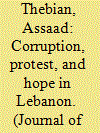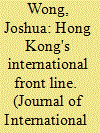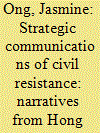|
|
|
Sort Order |
|
|
|
Items / Page
|
|
|
|
|
|
|
| Srl | Item |
| 1 |
ID:
176179


|
|
|
|
|
| Summary/Abstract |
The Thai monarchy, in partnership with the powerful military, has faced an unprecedented challenge from protesters aiming to rein in its unchecked informal authority through specific reforms in adherence with the country's Constitution. For decades, the two institutions had forged a solid partnership, which has stridently dominated the Thai political landscape, leaving a little room for contest from the opposition. But the monarchy under King Maha Vajiralongkorn faces a new crisis of legitimacy, as shown by the manifest evidence of the ten-point demands articulated by the protesters, as well as my independent investigation into the feasibility of open dialogue on the status of the monarchy.
|
|
|
|
|
|
|
|
|
|
|
|
|
|
|
|
| 2 |
ID:
176187


|
|
|
| 3 |
ID:
176181


|
|
|
|
|
| Summary/Abstract |
Egypt, the largest state in the Middle East and North Africa region, has long been distinct since the 1970s for its large informal economy, defined in this paper as the economic activities, services, and its related jobs and enterprises that are not regulated or protected by the state. Likewise, it has experienced forms of social unrest, including several instances of large-scale protest, in the ensuing decades. Three protests—in 1977, 2011, and 2019—are analyzed, identifying the reasons surrounding their emergence and how they illustrate the relationship between the informal economy and the state of civil unrest in Egypt.
|
|
|
|
|
|
|
|
|
|
|
|
|
|
|
|
| 4 |
ID:
176185


|
|
|
| 5 |
ID:
176178


|
|
|
|
|
| Summary/Abstract |
Protests are a regular feature of life in the Islamic Republic of Iran. Using street power to push for incremental change or voice discontent with government policy, major protests in Iran have been closely identified with the country's reform movement. But from 2017 to the present, we posit that the aim of protests has drifted from reform towards revolution. We use the observable trend of change in geography, demography, violence levels, organization/cohesion, and slogans of protests to argue that the 2017 event was a change point: a structural break from reform to revolution. Drawing on the scholarship of Ted Robert Gurr and Alexis de Tocqueville on expectations for change and rebellion, we trace the structural and domestic political conditions that existed before 2017, and subsequently examine the five factors. We conclude with the impact this will have on future street protests in Iran and flashpoints for change.
|
|
|
|
|
|
|
|
|
|
|
|
|
|
|
|
| 6 |
ID:
176174


|
|
|
|
|
| Summary/Abstract |
This paper examines the rise of conflicts over the extraction of natural resources in the developing world. It emphasizes the main factors that motivate collective action: threats and opportunities. Challengers join in action to avoid the adverse socio-environmental effects associated with extraction, but they also mobilize because of new opportunities or advantages that extraction brings to host communities. These incentives are most likely to trigger collective action at the local level but can also prompt the participation of outside groups, depending on the nature of the threat. Mobilization strategies are partly shaped by the local conditions where mining is taking place; preventive mobilization is favored in some areas and the judicialization of conflicts in others. This paper draws on two extractive conflicts, the Tía María copper project in Peru and the Fuleni coal project in South Africa, to illustrate the drivers of collective action, the nature of mobilizing methods, and the impact of these methods on the cancellation of the projects. It concludes by discussing the long-term impact of mobilizing strategies on extractive conflicts.
|
|
|
|
|
|
|
|
|
|
|
|
|
|
|
|
| 7 |
ID:
176189


|
|
|
| 8 |
ID:
176183


|
|
|
| 9 |
ID:
176173


|
|
|
|
|
| Summary/Abstract |
From collective flash-mobs such as "clap for our carers," to solidarity campaigns launched by a variety of activist organizations, to the Black Lives Matter movement and anti-lockdown protests by right-wing groups, the COVID-19 crisis has been marked by intense social protest. In this article, I analyze these protests as different responses to the exceptional conjuncture of the pandemic, through the lens of social movement theory and the analysis of grievances and action repertoires. Focusing on the United States and Europe, I highlight that protests during the pandemic reveal the nature of the COVID-19 emergency as a moment of political suspension and heightened social confrontation. Different movements respond to the COVID-19 health crisis either by navigating the straits between voicing dissent and abiding by health rules while demanding a return to pre–COVID-19 normality, or by seeing the disruption of the pandemic as an opportunity to seek redress for deep-seated problems. Regardless of their differences, pandemic protests point to the return of a crowd element and impromptu and spontaneous forms of action through tactics such as sit-ins, banging pot protests, the occupation of building, the toppling of statues symbolizing the enemy, or the foiling of anti-contagion rules. This return to pre-modern protest logics highlights the depth of the crisis of authority revealed by COVID-19, during which inequalities have further intensified.
|
|
|
|
|
|
|
|
|
|
|
|
|
|
|
|
| 10 |
ID:
176184


|
|
|
| 11 |
ID:
176182


|
|
|
|
|
| Summary/Abstract |
Recognizing the increasing ubiquity of protest in the United States, this article considers why protest has become so central to American politics. It argues that three factors contribute substantially to this situation: institutional illegitimacy, political polarization, and decentralization of communications media. Institutional illegitimacy means that Americans are less likely to trust the prevailing system of government, such as selecting the president through the Electoral College, making them more likely to believe that protest is necessary to have their voices heard. Political polarization coincides with having elected officials on the extremes of the political spectrum, rather than toward the moderate center. Citizens are thus more likely to be dissatisfied with elected officials and to turn out to protest them. Decentralization of communications media, especially social media (e.g. Twitter, Facebook, Instagram), allows activists to communicate with one another more readily and, therefore, to organize protests quickly and with few financial resources. These conditions are unlikely to change in the near future outside of a major partisan realignment. Recent protests organized by Black Lives Matter and related groups, in response to the deaths of George Floyd and many other African Americans, illustrate the contemporary nature of activism, social movements, and protest in the United States.
|
|
|
|
|
|
|
|
|
|
|
|
|
|
|
|
| 12 |
ID:
176172


|
|
|
|
|
| Summary/Abstract |
Predatory governments in the Middle East have survived despite widespread popular revolt and epic governance failures. Only a new governing compact can end this destructive but sustainable cycle. Using the examples of Lebanon and Iraq, we show how hybrid reform efforts that recognize the weakness of the state can renew approaches to citizenship, stability, and security.
|
|
|
|
|
|
|
|
|
|
|
|
|
|
|
|
| 13 |
ID:
176175


|
|
|
|
|
| Summary/Abstract |
In the decade following independence, India, Pakistan, and Sri Lanka all saw ethnic protests as a result of nationalist language policies. The outcomes of these protests varied from peaceful co-optation by the state to civil war. What explains this? Research on ethnic unrest in the region has focused on structural factors, using identity cleavages, social networks, and ethnic fractionalization to explain how an ethnic group may behave during periods of unrest. In contrast, this paper examines three cases of ethnic protests in the context of state response. Tracing the process of the unrest, I identify specific positive or negative state actions as determinants of how the unrest resolves. Where the state bars protesters from access to the democratic sphere, violent conflict results. Where the state actively engages with protesters in the democratic sphere, the protests are peacefully co-opted. The findings show the costs to a state of taking hardline stances with protesters in situations of ethnic unrest and how they may engage with protesters to defuse unrest.
This is the content viewer section. Skip to metadata section.
|
|
|
|
|
|
|
|
|
|
|
|
|
|
|
|
| 14 |
ID:
176171


|
|
|
|
|
| Summary/Abstract |
How have activists responded to the COVID-19 pandemic? While there have been many anecdotal reports of the pandemic's impact, there has been little to no cross-national comparative research examining how movements discouraged from protesting on the streets because of the risk of infection have or have not continued their activities through the COVID-19 pandemic. In this paper we present findings from a survey of 550 activists in 27 countries, reporting on how the pandemic has affected their perceptions of tactical adaptation, public interest, and long-term strategic planning. We also present results from a survey experiment testing the impact of COVID-19 risk and pandemic lockdown policies on activists' willingness to join a street protest. We find that while the pandemic has posed significant challenges for activists, activists believe they have been able to respond with tactical adaptation and innovations, primarily with a shift to digital activism. Most activists also perceived an increase in public interest for their movements across various issue areas and were optimistic about their movement's ability to advance its goals in the future. These findings speak to the long-term impact of COVID-19 on the potential for social mobilization and the short and projected long-term effects of the pandemic on political stability.
|
|
|
|
|
|
|
|
|
|
|
|
|
|
|
|
| 15 |
ID:
176186


|
|
|
| 16 |
ID:
176191


|
|
|
| 17 |
ID:
176176


|
|
|
|
|
| Summary/Abstract |
Hong Kong's 2019–20 Water Movement has two distinctive features, expressed in Cantonese as "no main stage" (leaderless) and "no mat-cutting" (do not split). Drawing on original sources and firsthand experience on the ground, this paper reviews the campus standoff of the Chinese University of Hong Kong in November 2019 in relation to the principle and strategy of the leaderless movement. I argue that the imposed emphasis on the principle of "no main stage" has created another type of invisible power, discouraging individuals who possess experience, knowledge, and skills from contributing to the movement. In the name of avoiding "main stage," the more radical populist voices that do not necessarily represent the majority of protesters became, in effect, the "main stage," and made uncompromising decisions that would further limit political space. While the Water Movement as a protest movement has temporarily come to an end with the imposition of the National Security Law, as a social movement it is still an unfolding story.
|
|
|
|
|
|
|
|
|
|
|
|
|
|
|
|
| 18 |
ID:
176177


|
|
|
|
|
| Summary/Abstract |
The 2011 global protest cycle, which included the Arab Spring uprising against authoritarian rule, the Chilean Winter protests to end for-profit education, and the Occupy Wall Street movement in the United States to highlight income inequality, marked the most important protest cycle since the movements of the 1960s in Europe and North America. Protest cycles are critical opportunities to effect political and institutional change, yet progress is not guaranteed. The key factors for fostering a positive link between protest levels and long-term reform are the permeability of political institutions to protesters' demands and the willingness of demonstrators to engage with those institutions. The central argument of this piece is that the 2011 Chilean Winter protesters asked for too little, and by doing so, missed their historic opportunity to bring about fundamental change. Instead of demanding structural change to the political and economic models underpinning their system of governance, they asked for policy change within that system. By 2019, when Chilean protesters demanded constitutional reform, their window of opportunity for deep-seated political and institutional change had already closed.
|
|
|
|
|
|
|
|
|
|
|
|
|
|
|
|
| 19 |
ID:
176180


|
|
|
|
|
| Summary/Abstract |
Spain, among the countries hardest hit by the COVID-19 pandemic, imposed one of the most severe lockdowns in Europe, which was administered by a left-leaning government under Prime Minister Pedro Sánchez. This provided an opportunity for Vox, a far-right populist party, to gain further popularity by promoting anti-lockdown protests. The process by which Vox has gained influence in Spanish politics over the last year shows the vulnerabilities in the Spanish system to anti-democratic and anti-pluralistic forces, and the ways in which the context of the pandemic and the act of protest enhances those forces in the short term."
|
|
|
|
|
|
|
|
|
|
|
|
|
|
|
|
| 20 |
ID:
176190


|
|
|
|
|
|
|
|